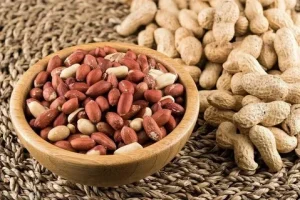Peanuts
Peanuts contain protein, vitamins, minerals, and antioxidants. Among the benefits of peanuts are preventing hunger and reducing the risk of heart disease. Peanuts (scientifically known as Arachis hypogaea) are legumes that originated in South America. Despite their name, they do not belong to the nut family but are classified as legumes, alongside beans, lentils, and soybeans.
13 Raw peanuts are not popular in the United States and are mostly consumed roasted or as peanut butter. Peanut oil, flour, and protein are other peanut-derived products used in various foods such as desserts, cakes, pastries, snacks, and sauces.
Peanuts are rich in protein, fats, and various healthy nutrients. Research shows that peanuts can aid in weight loss and reduce the risk of heart disease. In this article from the Nutrition Department of the Health Clinic, we will discuss the benefits of peanuts.
Nutritional Content 100 grams of raw peanuts contain the following:
• Calories: 567
• Water: 7%
• Protein: 25.8 grams
• Carbohydrates: 16.1 grams
• Sugar: 4.7 grams
• Fiber: 8.5 grams
• Fat: 49.2 grams
o Saturated fat: 6.28 grams
o Monounsaturated fat: 24.43 grams
o Polyunsaturated fat: 15.56 grams
o Omega-3: 0 grams
o Omega-6: 15.56 grams
o Trans fat: 0 grams





